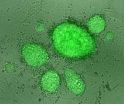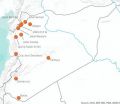(Press-News.org) A group of international scientists have developed a new method to study Ebola virus in wildlife. Video link here.
The Wildlife Conservation Society (WCS)-led research, published today in the journal PLOS Neglected Tropical Diseases, describes the use of fecal samples from wild great apes to identify populations likely to have been exposed to the virus. This represents a new tool for performing large, population-scale field assessments that can potentially change the way Ebola virus is studied and improve our understanding of the virus' distribution in space and time—a matter of great importance to both the human health and conservation communities.
Despite 30 years of Ebola virus research, including on how it is maintained in the wild and how it emerges in wildlife, there is still much to understand. This is due, in part, to the difficulty of capturing and sampling wild animals in Africa's vast rainforests. Previous Ebola investigations have relied on blood or tissue samples collected from wildlife, but these samples are difficult and expensive to obtain. The methodology published today provides a potential solution; a simple, non-invasive tool for screening large populations of great apes for Ebola virus exposure, providing scientists and conservationists with more information about this mysterious pathogen.
"Ethical issues, as well as the cost and risk involved, make hands-on examination of wild great apes for research problematic," said WCS field veterinarian Dr. Kenneth Cameron. "This new methodology will make immunologic studies in wild apes safer and much easier, providing us with the ability to answer research questions that simply were beyond reach before."
The new methodology exploits the fact that, like humans, apes surviving viral infections develop antibodies against them. Typically, those antibodies are measured in the blood. The scientists, however, developed a laboratory technique that can isolate antibodies from ape feces.
As part of the study, fecal samples from 80 free-ranging wild gorillas from five different habitats in northern Republic of Congo were collected and tested. Almost half of those were collected within 2-4 years of confirmed Ebola outbreaks in resident apes. Overall, 10% of the samples tested positive, illustrating the success of this test in detecting antibodies against Ebola virus in feces.
Currently, the worst ever human Ebola virus disease (EVD) epidemic is occurring in West Africa. The virus responsible, Zaire ebolavirus, has been associated with human outbreaks and major declines in wild chimpanzee and gorilla populations in Central Africa. Human cases have tended to follow wildlife outbreaks, usually through the consumption of infected wildlife, including great apes and fruit bats.
Avoiding consumption of wildlife found dead can prevent isolated spillover events of the virus from wildlife to humans, and bats sold as food in markets are a clear concern. Once outbreaks take hold in human communities, the public health community is tasked with trying to stop human to human disease transmission through barrier nursing, supportive care, contact tracing, isolation of those who become ill, and education of the public. These are challenging tasks in any situation, let alone in less developed nations where EVD has repeatedly emerged.
WCS veterinarian Alain Ondzie said, "If scientists can better understand patterns of Ebola virus infection in wildlife, the public health sector can be more prepared to prevent human outbreaks."
How long the great apes' antibodies persist or whether they confer protection against future infection will require further investigation, but their presence suggests that, as with humans, some apes survive Ebola virus infection. This information will allow researchers to identify regions where Ebola virus has emerged in wildlife and potentially which ape populations are most susceptible.
"It is fantastic that we can get this type of information from simply collecting fecal samples from the forest floor," said Dr. Patricia Reed, who helped oversee this work as a wildlife veterinarian for the Wildlife Conservation Society (WCS). "From a wildlife conservation perspective, we can use this information to target our limited resources and get more information in-hand more quickly in order to protect great ape populations most at risk for new infections. And the more we learn about the ecology of this pathogen, the more we can proactively assist the public health community."
With this method, ape feces can be collected over large areas of forest habitat where Ebola is a threat, and levels of antibodies in the sampled animals can be compared over time and between seasons and regions – all without the expense and risks of animal capture and handling. Fecal screening thus opens many new exciting doors to better understand the disease ecology of Ebola and potential management options. For wild great apes this includes longitudinal studies of immune response that can be paired with genetic identification of individuals following outbreaks, identifying unexposed populations for greater anti-poaching protection or future vaccine studies, and monitoring the effectiveness of Ebola vaccines, should such vaccines become a practical reality for free-ranging great apes. This approach could also be adapted to other species that may play roles in Ebola virus transmission, such as small antelope and wild pigs.
INFORMATION:
The co-authors of the study, "A New Approach for Monitoring Ebolavirus in Wild Great Apes" are:
Patricia E. Reed of WCS (formerly); Sabue Mulangu of National Institutes of Health (NIH); Kenneth N. Cameron of WCS; Alain U. Ondzie of WCS; Damien Joly of WCS (formerly) and Metabiotia, Inc. (Canada); Magdalena Bermejo of the University of Barcelona (Spain); Pierre Rouquet of ECOFAX (Gabon); Giulia Fabozzi of NIH; Michael Bailey of NIH; Zhimin Shen of NIH; Brandon F. Keele of Frederick National Laboratory in Maryland; Beatrice Hahn of the University of Alabama, Birmingham and University of Pennsylvania, Philadelphia; William B. Karesh of WCS (formerly) and Ecohealth Alliance; and Nancy J. Sullivan of NIH.
The article can be found here.
This study was supported by: the United States Fish and Wildlife Service; the Arcus Foundation; the Paul G. Allen Family Foundation; the United States Agency for International Development's Emerging Pandemic Threats PREDICT program; CSR Tullow Oil Society; the Réseau des Aires Protégées d'Afrique Centrale (RAPAC), the extramural grants (R01 AI50529 and R01 AI58715) and the Intramural Research Program of the U.S. National Institutes of Health; National Institute of Allergy and Infectious Diseases, Vaccine Research Center; among others. The funders had no role in study design, data collection and analysis, decision to publish, or preparation of the manuscript and the findings do not represent the opinions of the US government.
Research yields a game changer for improving understanding of Ebola and great apes
Fecal screening detects Ebola antibodies in wild great apes, suggests some apes survive exposure
2014-09-18
ELSE PRESS RELEASES FROM THIS DATE:
Single dose of antidepressant changes the brain
2014-09-18
A single dose of antidepressant is enough to produce dramatic changes in the functional architecture of the human brain. Brain scans taken of people before and after an acute dose of a commonly prescribed SSRI (serotonin reuptake inhibitor) reveal changes in connectivity within three hours, say researchers who report their observations in the Cell Press journal Current Biology on September 18.
"We were not expecting the SSRI to have such a prominent effect on such a short timescale or for the resulting signal to encompass the entire brain," says Julia Sacher of the Max ...
Gambling with confidence: Are you sure about that?
2014-09-18
Cold Spring Harbor, NY – Life is a series of decisions, ranging from the mundane to the monumental. And each decision is a gamble, carrying with it the chance to second-guess. Did I make the right turn at that light? Did I choose the right college? Was this the right job for me?
Our desire to persist along a chosen path is almost entirely determined by our confidence in the decision: when you are confident that your choice is correct, you are willing to stick it out for a lot longer.
Confidence determines much of our path through life, but what is it? Most people ...
Stem cells use 'first aid kits' to repair damage
2014-09-18
Stem cells hold great promise as a means of repairing cells in conditions such as multiple sclerosis, stroke or injuries of the spinal cord because they have the ability to develop into almost any cell type. Now, new research shows that stem cell therapy can also work through a mechanism other than cell replacement.
In a study published today in Molecular Cell, a team of researchers led by the University of Cambridge has shown that stem cells "communicate" with cells by transferring molecules via fluid filled bags called vesicles, helping other cells to modify the damaging ...
NYU Langone scientists report reliable and highly efficient method for making stem cells
2014-09-18
NEW YORK, September 18, 2014 – Scientists at NYU Langone Medical Center have found a way to boost dramatically the efficiency of the process for turning adult cells into so-called pluripotent stem cells by combining three well-known compounds, including vitamin C. Using the new technique in mice, the researchers increased the number of stem cells obtained from adult skin cells by more than 20-fold compared with the standard method. They say their technique is efficient and reliable, and thus should generally accelerate research aimed at using stem cells to generate virtually ...
The war on leukemia: How the battle for cell production could be decisive
2014-09-18
A key step in understanding the nature of the fight for superiority between mutated genes and normal genes could lead to new therapies to combat leukaemia, say researchers from the University of Birmingham and Newcastle University.
The study, published in Cell Reports, investigated Acute Myeloid Leukaemia to understand why leukemic cells are not able to develop normally into mature blood cells.
Stem cells in the bone marrow generate billions of different blood cells each day. The process resembles a production line with genes acting as regulators to control each step ...
NASA sees Hurricane Edouard enter cooler waters
2014-09-18
VIDEO:
On Sept. 17 at 03:39 UTC, the TRMM satellite saw a newer outer eyewall forming around Edouard's original eyewall creating a double eye-wall structure. Red indicates heavy rainfall....
Click here for more information.
NASA's Tropical Rainfall Measuring Mission or TRMM satellite and Aqua satellite gathered data on Hurricane Edouard's rainfall, clouds and waning power is it continued moving northward in the Atlantic into cooler waters. On Sept. 18, NASA's Global Hawk #872 ...
Scientists find how mysterious 'circular RNA' is formed, claim muscular dystrophy link
2014-09-18
Our genetic information is stored in DNA, tiny strands of nucleic acid that contain instructions for the functioning of our bodies. To express this genetic data, our DNA is copied into RNA molecules, which then translate the instructions into proteins that perform tasks in our cells.
Several years ago, scientists discovered a new type of RNA molecule. Unlike all other known RNAs, this molecule is circular, and was labeled circular RNA. Although circRNA molecules are abundant, little has been known about how they are produced. Moreover, little has been known about the ...
Flu vaccine for expectant moms a top priority
2014-09-18
WHITE PLAINS, NY, SEPT. 18, 2014 -- Only about half of all pregnant women in the U.S. get a flu shot each season, leaving thousands of moms-to-be and their babies at increased risk of serious illness.
"Getting a flu shot should be a routine part of prenatal care," said Edward McCabe, MD, March of Dimes chief medical officer. "Health care providers should offer their pregnant patients a flu shot each year and if they don't, then women should ask for it."
A report by the U.S. Centers for Disease Control and prevention presented today by the National Foundation for ...
New high-resolution satellite image analysis: 5 of 6 Syrian World Heritage sites 'exhibit significant damage'
2014-09-18
SEPTEMBER 18 —In war-torn Syria, five of six World Heritage sites now "exhibit significant damage" and some structures have been "reduced to rubble," according to new high-resolution satellite image analysis by the nonprofit, nonpartisan American Association for the Advancement of Science (AAAS).
The AAAS analysis, offering the first comprehensive look at the extent of damage to Syria's priceless cultural heritage sites, was completed in partnership with the University of Pennsylvania Museum of Archaeology and Anthropology's Penn Cultural Heritage Center (PennCHC) and ...
NASA marks Polo for a hurricane
2014-09-18
Hurricane Polo still appears rounded in imagery from NOAA's GOES-West satellite, but forecasters at the National Hurricane Center expect that to change.
NOAA's GOES-West satellite captured data on Hurricane Polo on Sept. 18 at 10:15 a.m. EDT. An image using that data was created by the NASA/NOAA GOES Project at NASA's Goddard Space Flight Center in Greenbelt, Maryland. The image showed thunderstorms wrapping tightly around the center of the storm while one broken band of thunderstorms extended to the northwest, while the other appeared on the eastern side of the center ...
LAST 30 PRESS RELEASES:
Bacteria frozen in ancient underground ice cave found to be resistant against 10 modern antibiotics
Rhododendron-derived drugs now made by bacteria
Admissions for child maltreatment decreased during first phase of COVID-19 pandemic, but ICU admissions increased later
Power in motion: transforming energy harvesting with gyroscopes
Ketamine high NOT related to treatment success for people with alcohol problems, study finds
1 in 6 Medicare beneficiaries depend on telehealth for key medical care
Maps can encourage home radon testing in the right settings
Exploring the link between hearing loss and cognitive decline
Machine learning tool can predict serious transplant complications months earlier
Prevalence of over-the-counter and prescription medication use in the US
US child mental health care need, unmet needs, and difficulty accessing services
Incidental rotator cuff abnormalities on magnetic resonance imaging
Sensing local fibers in pancreatic tumors, cancer cells ‘choose’ to either grow or tolerate treatment
Barriers to mental health care leave many children behind, new data cautions
Cancer and inflammation: immunologic interplay, translational advances, and clinical strategies
Bioactive polyphenolic compounds and in vitro anti-degenerative property-based pharmacological propensities of some promising germplasms of Amaranthus hypochondriacus L.
AI-powered companionship: PolyU interfaculty scholar harnesses music and empathetic speech in robots to combat loneliness
Antarctica sits above Earth’s strongest “gravity hole.” Now we know how it got that way
Haircare products made with botanicals protects strands, adds shine
Enhanced pulmonary nodule detection and classification using artificial intelligence on LIDC-IDRI data
Using NBA, study finds that pay differences among top performers can erode cooperation
Korea University, Stanford University, and IESGA launch Water Sustainability Index to combat ESG greenwashing
Molecular glue discovery: large scale instead of lucky strike
Insulin resistance predictor highlights cancer connection
Explaining next-generation solar cells
Slippery ions create a smoother path to blue energy
Magnetic resonance imaging opens the door to better treatments for underdiagnosed atypical Parkinsonisms
National poll finds gaps in community preparedness for teen cardiac emergencies
One strategy to block both drug-resistant bacteria and influenza: new broad-spectrum infection prevention approach validated
Survey: 3 in 4 skip physical therapy homework, stunting progress
[Press-News.org] Research yields a game changer for improving understanding of Ebola and great apesFecal screening detects Ebola antibodies in wild great apes, suggests some apes survive exposure




